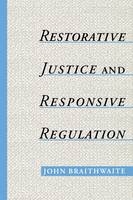
Restorative Justice & Responsive Regulation
Seiten
2002
Oxford University Press Inc (Verlag)
978-0-19-515839-7 (ISBN)
Oxford University Press Inc (Verlag)
978-0-19-515839-7 (ISBN)
Restorative Justice has become an important new way of thinking about crime, responsive regulation an influential way of thinking about business regulation. In this volume, John Braithwaite brings together his important work on restorative justive with his work on business regulation to form a sweepingly novel picture of the way society regulates itself.
Braithwaite's argument against punitive justice systems and for restorative justice systems establishes that there are good theoretical and empirical grounds for anticipating that well designed restorative justice processes will restore victims, offenders, and communities better than existing criminal justice practices. Counterintuitively, he also shows that a restorative justice system may deter, incapacitate, and rehabilitate more effectively than a punitive system. This is particularly true when the restorative justice system is embedded in a responsive regulatory framework that opts for deterrence only after restoration repeatedly fails, and incapacitation only after escalated deterrence fails. Braithwaite's empirical research demonstrates that active deterrence under the dynamic regulatory pyramid that is a hallmark of the restorative justice system he supports, is far more effective than the passive deterrence that is notable in the stricter "sentencing grid" of current criminal justice systems.
Braithwaite's argument against punitive justice systems and for restorative justice systems establishes that there are good theoretical and empirical grounds for anticipating that well designed restorative justice processes will restore victims, offenders, and communities better than existing criminal justice practices. Counterintuitively, he also shows that a restorative justice system may deter, incapacitate, and rehabilitate more effectively than a punitive system. This is particularly true when the restorative justice system is embedded in a responsive regulatory framework that opts for deterrence only after restoration repeatedly fails, and incapacitation only after escalated deterrence fails. Braithwaite's empirical research demonstrates that active deterrence under the dynamic regulatory pyramid that is a hallmark of the restorative justice system he supports, is far more effective than the passive deterrence that is notable in the stricter "sentencing grid" of current criminal justice systems.
John Braithwaite is professor of Law at Australian National University. He is currently a visiting professor at New York University School of Law. He is the author of Responsive Regulation (OUP,1995) with Ian Ayers.
| Erscheint lt. Verlag | 21.11.2002 |
|---|---|
| Reihe/Serie | Studies in Crime and Public Policy |
| Zusatzinfo | 6 figures |
| Verlagsort | New York |
| Sprache | englisch |
| Maße | 227 x 153 mm |
| Gewicht | 490 g |
| Themenwelt | Recht / Steuern ► EU / Internationales Recht |
| Recht / Steuern ► Strafrecht ► Kriminologie | |
| Sozialwissenschaften ► Politik / Verwaltung ► Staat / Verwaltung | |
| Sozialwissenschaften ► Soziologie | |
| Wirtschaft ► Betriebswirtschaft / Management ► Unternehmensführung / Management | |
| ISBN-10 | 0-19-515839-3 / 0195158393 |
| ISBN-13 | 978-0-19-515839-7 / 9780195158397 |
| Zustand | Neuware |
| Haben Sie eine Frage zum Produkt? |
Mehr entdecken
aus dem Bereich
aus dem Bereich
klare Antworten aus erster Hand
Buch | Softcover (2023)
UTB (Verlag)
19,90 €


